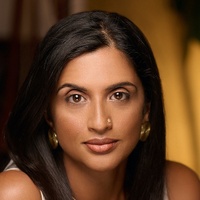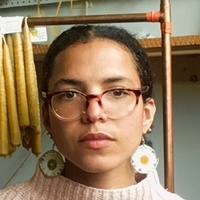On making time for your creative work
Author Tania James discusses recognizing your limitations, how teaching and motherhood shifted her relationship with time, and starting from a place of endless possibility.How did growing up in Kentucky affect your writing?
Massively. A pivotal event for me was applying to the Kentucky Governor’s School for the Arts, which is an artistic bootcamp for 16- and 17-year-olds. I got in as a creative writer, and, though I doubt I grew much as a writer in those three weeks, my perception of what a writer could look like grew by leaps and bounds. My teachers were Black poets—Kelly Norman Ellis and Frank X Walker—and just the fact that they were working writers of color exploded my notions of what writers could be, what literature could be. Until then I’d only read dead white people, for the most part, and I’d mimicked those voices as much as I could. So when Frank and Kelly encouraged us, through exercises, to mine our own experiences and memories—that too was revelatory.
Now that you are very much a working writer, what does writing community mean to you?
I wish I could say I had a writing community, but what I have feels more diffuse and social-media based. I’m not sure that that’s community. I do feel genuine and powerful connections to individual writers. Watching their work take shape from afar makes me feel less alone in my own work. But if I were to think a bit more deeply about this term: maybe community is a more flexible concept, like the spaces that bookstores and libraries create, where everyone doesn’t necessarily know one another, but where we share a belief in the value of books. That value has us getting out of our houses and taking the train to sit in folded chairs together and simply listen. It’s more of a reading community, I suppose, than a writing community, but this, too, nurtures my own sense of purpose when going back to the desk.
Are there ways in which both teaching and motherhood fuel your creativity?
Teaching and motherhood have changed my whole relationship to time. I think more in terms of seasons and semesters now, phases when you’re really inside a work, and phases when your greatest demands are elsewhere. Both teaching and motherhood have also pressurized my time, which demands a heightened focus. I’ve grown more comfortable with the concept of writing without pen or paper or laptop, by simply observing something and trying to distill it into language, for later use.
How do you protect your writing self?
One piece of advice that an academic gave me when I first started teaching was to spend the first 30 minutes of every day on your own work. Making writing the first thing in my day is a way of reminding myself where I want to put the bulk of my creative energy. These early morning sessions don’t always happen but when I’m really inside a work, I can’t help but at least touch it with my brain every single day.
Do you also have seasons of short stories and seasons of novels, or do you write them alongside each other?
I tend to work on short stories when I’m taking a break from a novel. I wrote maybe two or three stories while I was writing Loot, usually when I was done with a draft and I wanted some distance, but I just don’t function well when I’m not working on anything. I wish I could take the advice of just rest and nourish yourself. I hear that and it sounds right to me, but I’m kind of a crabby person when I don’t have an artistic practice. I need something to be engaged in imaginatively.
Do you have artistic practices beside writing?
Dancing. As a child, I did tap dance and classical Indian dance, specifically Bharatanatyam. I stopped after college, but a few years ago, a friend of mine who is an extremely skilled classical dancer started a very small collective of women who practice Kuchipudi (another classical form). We gathered through Zoom during the pandemic, or we’d gather in her home.
What’s great about my dance practice is that it isn’t as goal oriented as my writing practice. With writing, I’m often thinking in terms of getting to the end of a scene, or a chapter, or to the end. With dance, I’m just trying to focus on the minutiae of where my hands are and what my body is doing. There’s something pure about it. Also, I’m far from the best person in the room, nor am I trying to be. There is no audience, other than the mirror. It’s a humbling kind of pleasure.
How do you handle the pressure to be the best writer in the room?
As a teacher, it always excites me when I can identify the student who wrote a particular story without reading their name at the top of the page. Usually this has nothing to do with the subject matter and more to do with the unique watermark of that person’s voice or sensibility. It’s hard to describe but thrilling to identify. And it reminds me that being the boldest version of yourself on the page is the real goal. Being as true to your own interests and obsessions, as attentive to the details that matter to you. That’s a far worthier pursuit than being the best.
How do you integrate research into your writing process?
I’m not great at historical research. I often find historical record to be dense, dry, and faux-neutral sounding—though of course some historians, like William Dalrymple and Maya Jasanoff, are great at creating propulsive arguments and recreating vivid figures in history. Mainly I trawl through the research with pen in hand, noting any detail that strikes me as idiosyncratic or absurd or relevant to a particular character. And then once I’ve convinced myself that I’m a kind of authority on the subject (be it sea-faring, or woodworking, or English country house etiquette), I set off into the story, and very little of my research makes it onto the page.
Do you see yourself—or see Loot—as belonging to any literary tradition or traditions?
In Loot, one problem I kept running up against was that I couldn’t imagine a character of this status—a low-level wood carver—traveling so many miles and having so many adventures. But then I realized that I needed to let go of the idea that I was writing social realism. I now see this novel as part of the picaresque tradition, which has generally been the territory of young white male protagonists. Washington Black, by Esi Edugyan, was an eye-opening read for me in that she presents us with a protagonist who escapes from slavery, and then she liberates him from traditional slave narratives by setting him off on a string of adventures that take him as far as the Antarctic. That novel helped me to see possibilities in my own.
It may be too soon to ask this, but can you imagine liberating yourself from social realism having a ripple effect through your career?
I don’t know, because with every book, I have to learn what I can get away with. Maybe this is the only reliable rule in writing fiction, at least for me: take the risk and then see if you’ve gotten away with it, by giving the work to trusted readers. If it’s the right reader, they’ll let you know right away.
How do you know when a project has failed?
A sign to step away is when a project has stopped asking questions of me. A work that feels alive is one that feels like it’s constantly tapping on my shoulder, intruding into my waking life. With some projects that haven’t worked, they just stopped speaking.
A lot of times, in early drafts, I feel like I’m on the outside of the story, looking for the door that if I open it, will show me why this thing matters to me personally. With some failed projects I couldn’t make work, I couldn’t find that personal connection to the material—though I don’t know that I’ll never find it.
Are there ways in which you find it helpful to have a partner who isn’t a writer?
My husband reads everything I write. He’s trained as a lawyer, and so the questions he’s often asking are questions that I’m not even thinking to ask. Often, he’s tracing the logic of a character or questioning a character’s belief system. It’s useful to get that sort of perspective, rather than the perspective of someone who might be more interested in the construction of sentences or imagery—he observes story in a different way, and I find it very helpful.
Where do your books begin?
I often start with a situation and work my way back to character. Loot started with an object—the automaton known as Tipu’s Tiger. I was somewhat obsessed with it, and so I began reading more and more about it. I didn’t know why I was obsessed with it, but I wasn’t really interested in the question of why I was obsessed with it. I made myself take the advice that I give to students sometimes, which is to give your obsession to a character. It automatically electrifies the story in some way.
How do you know when you’re done? And is it hard to let go?
If I’m starting from one place, I’m trying to see how far away from that place I can get on an emotional level. For example, the protagonist of Loot develops an obsession early on, so I sensed that the arc of the novel would end with a release from that obsession, in one way or another—disappointment, disillusionment, or a different kind of liberation.
For me, letting go of a novel isn’t hard. In terms of my own emotional arc during the writing process, I always start from a place of expansiveness and uncertainty and endless possibility. But towards the end of the writing process, there comes a point where I can clearly see my own limitations, or the limits of what the novel can be. It’s not depressing, it’s simply a reckoning with my own capabilities. In other words, it’s bittersweet, because then the finish line is in sight. I don’t miss my characters, but I do miss the momentary surprises that come with attending to them closely.
Tania James Recommends:
Laurel Canyon, a pop-country EP from Indo-American musician Samica
The Body In Question, a novel by Jill Ciment
mochi donuts
taking dance breaks when working from home
live theater, most recently Nosebleed by Aya Ogawa, which was funny and devastating, my favorite combination




